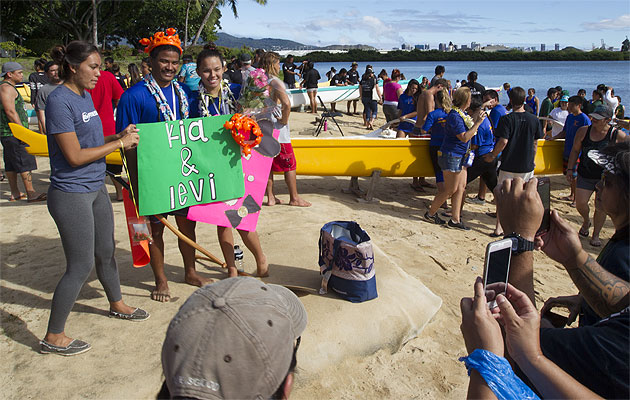
Keehi Lagoon has become one of Oahu’s most heavily-used venues for participants, coaches and onlookers engaging in the state sport of outrigger canoe paddling.
However, while the lagoon’s waters provide a fair, flat race course, the site has been devoid of a true sandy shore for years and the safety of those using the site has come into question.
If a new bill making its way through the state legislature becomes law, the lagoon’s beach park will be replenished with much-needed sand. Keehi Lagoon hosts both Oahu Hawaiian Canoe Racing Association and Na ‘Ohana O Na Hui Wa‘a regattas during summer months, serves as the site for HHSAA state paddling championship competitions twice every three years and is also home to six canoe clubs throughout the year as well as seven Oahu Interscholastic Association member schools during the prep paddling season.
Currently, the replenishment appropriation bill dubbed S.B. No. 263 has been adopted, passed after a second reading and referred to the Senate Ways and Means Committee headed by Sen. Jill Tokuda.
Over the years, constant use and natural erosion have led to a receding shoreline at the lagoon, which in turn has exposed jagged rocks and concrete fragments that have been known to cause nasty cuts to paddlers, boat holders and officials entering and exiting Keehi Lagoon’s notoriously dirty water. The bill states that the replenishment project, which has no firm cost yet, will address the issue of “dangerous conditions for the children and youth who come for canoe racing practices and competitions. This community attraction is no longer safe for people to enjoy.”
Gino Dayton is familiar with the lagoon’s deterioration as he coaches both the Keola O Ke Kai Canoe Club as well as Radford High School paddlers throughout the year with wife Jen Romano.
“Over time, with changing tides and weather, the sand has eroded and the beach has disappeared leaving behind sharp coral and rocks,” Dayton said. “The old sprinkler system is coming up from the ground where the sand once was. This saddens me because when there was sand, you could actually call it a beach.”
If passed into law, the act will take effect on July 1. The bill states that the funds would be expended by the state department of land and natural resources.
Those interested in learning more about the bill or generating input on the issue are encouraged to contact Tokuda via phone (587-7215), fax (587-7220), email (sentokuda@capitol.hawaii.gov) or mail (Hawaii State Capitol, Room 207).
“Every day, kids cut their feet on the jagged rocks and most, if not all of them, get some kind of infection including staph related to those cuts,” Dayton says. “(The replenishment) will also help prevent scrapes and scratches to our canoes, which take a lot of time and money to repair.”
COMMENTS